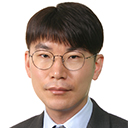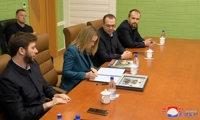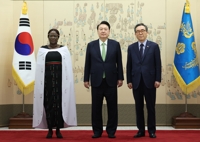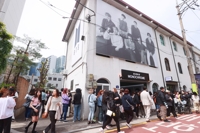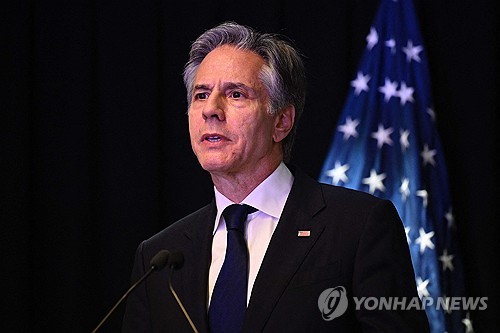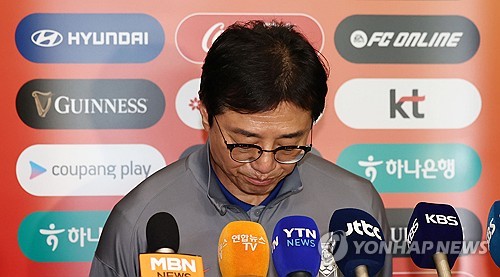(News Focus) Failed U.N. panel extension underscores deepening N.K.-Russia ties, security uncertainties
By Song Sang-ho
WASHINGTON, March 28 (Yonhap) -- This week's failure to extend the mandate of a U.N. expert panel monitoring the enforcement of anti-North Korea sanctions served as a sobering reminder of the unpalatable reality: burgeoning ties between Moscow and Pyongyang that have heightened security uncertainties on the Korean Peninsula.
During a session of the U.N. Security Council (UNSC) on Thursday, Russia vetoed a new resolution to extend the mandate of the Panel of Experts by another year, with China abstaining. Absent the resolution, the panel's mandate is set to expire on April 30.
Although the veto was a largely anticipated move, concerns heightened that the panel receding into history would embolden North Korea to conduct provocations with impunity and chip away at international efforts to curb its growing nuclear and missile threats.
Russia's exercise of the veto came as Moscow and Pyongyang have been deepening their military cooperation, under which the former has received munitions and ballistic missiles for its war in Ukraine with the latter seeking military technology assistance in return.
Closer alignment between the Cold War-era allies has raised worries about the prospects of a jelling geopolitical bloc involving China, which has boasted the "no-limits" partnership with Russia against the backdrop of a hardening Sino-U.S. rivalry over security, technology and trade.
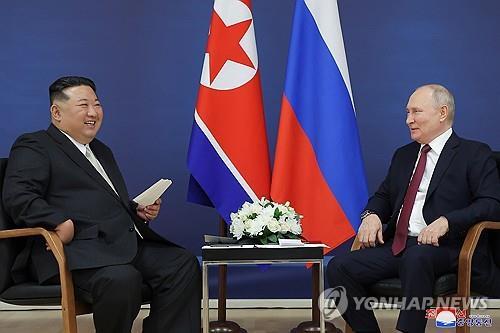
North Korean leader Kim Jong-un (L) holds talks with Russian President Vladimir Putin at the Vostochny Cosmodrome space launch center in the Russian Far East on Sept. 13, 2023, in this photo released by the North's official Korean Central News Agency the next day. (For Use Only in the Republic of Korea. No Redistribution) (Yonhap)
"It is a portentous strategic shift," Patrick Cronin, Asia-Pacific security chair at the Hudson Institute, told Yonhap News Agency via email. "It means a hardening of the axis of revisionist powers even though their axis remains more transactional and opportunistic."
Cronin cast Russia's veto as a feat for North Korean leader Kim Jong-un seeking to close ranks with Russia.
"Kim Jong-un's Kremlin courtship pays off. Pyongyang wants to end sanctions without slowing its strategic weapons programs," he said.
In the negotiations leading up to the UNSC vote on the resolution, Russia is said to have proposed a "sunset clause" for UNSC sanctions against Pyongyang -- a demand apparently unacceptable to Seoul, Washington and other members.
The sunset clause, if adopted, would leave sanctions in effect for a certain period of time unless there was a UNSC consensus to keep them in place for an additional period of time.
"Russia has called for the council to adopt a decision to hold an open and honest review of the council sanctions measures in respect of the DPRK, moving the restrictions onto an annual basis," Russian Ambassador to the U.N. Vasily Nebenzya said before the vote. DPRK stands for the North's official name, the Democratic People's Republic of Korea.
"If an agreement is reached for an annual extension of the sanctions, the mandate of the Panel of Experts would then make sense," he added.
The absence of the panel whose mainstay task is to monitor sanctions violations would make it easier for Russia to engage in arms transactions with the North that constitute a violation of multiple UNSC sanctions resolutions, analysts said.
Pyongyang has shipped over 10,000 containers of munitions or munition-related materials to Russia since September, as well as several dozen ballistic missiles, according to the U.S. government, as Moscow strives to replenish its weapons stockpile for use in Ukraine.
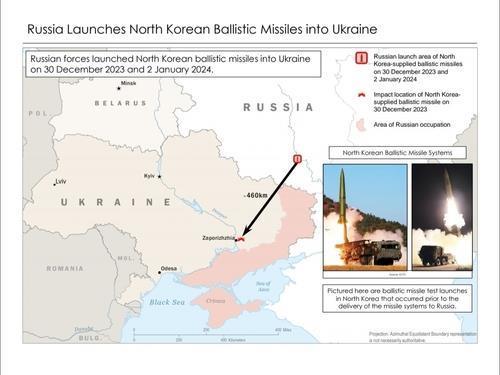
This image, provided by the White House, shows Russia's launch of North Korean ballistic missiles into Ukraine. (PHOTO NOT FOR SALE) (Yonhap)
"Russia's vetoing the extension is basically a proxy for them trying to undo some sanctions, because it'll now be easier for them to violate the sanctions," Bruce Bennett, a senior defense analyst at RAND Corp., told Yonhap News Agency over the phone.
"(The violations) could be more weapons from North Korea, could be Russia giving military aid to North Korea ... The lack of this panel of experts is going to undermine the monitoring of that and the reporting of that," he added.
Bennett warned that the abolition of the panel could lead Pyongyang to conduct more military provocations down the road.
"It'll embolden them to acquire new technologies, new capabilities, new sources, and have hard currency," he said. "If they have new capabilities, they probably will be tempted to do (provocations). They're going to want to test new missiles and new other technologies that will lead to provocations."
Signs of Russia flouting sanctions in support for the North have been widely reported.
Those reports include those on the recent arrival of North Korean workers in Russia and President Vladimir Putin's delivery of a luxury car to the North Korean leader to say nothing of the continued arms transfers from the North to Russia.
A deepening of the bilateral ties has been evidenced by recent high-level exchanges between the two countries. Sergei E. Naryshkin, director of Russia's External Intelligence Bureau (SVR), visited Pyongyang between Monday and Wednesday, according to the North's official Korean Central News Agency.
The strategic alignment between the North and Russia, coupled with China's apparent aversion to stringent anti-Pyongyang sanctions, bodes ill for the implementation of the sanctions regime against the North.
But Seoul, Washington and other like-minded countries are expected to ramp up their coordination through standalone or multilateral sanctions to tighten the screw on Pyongyang, observers said.
Just on Wednesday, South Korea and the U.S. imposed joint sanctions on less than 10 North Korean nationals and third-country entities accused of helping finance the North's weapons of mass destruction (WMD) programs.
"Despite today's veto and abstention, all Security Council resolutions and U.N. measures addressing the DPRK's unlawful WMD and ballistic missile programs remain in effect," Matthew Miller, a State Department spokesperson, told a press briefing.
"We will continue to work to counter the DPRK's unlawful actions, work with like-minded states through all available means to limit the threat posed by the DPRK, and respond to efforts by its enablers to shield the DPRK from responsibility," he added.
sshluck@yna.co.kr
(END)
-
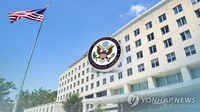 N. Korea denounces U.S. condemnation of human rights violations
N. Korea denounces U.S. condemnation of human rights violations -
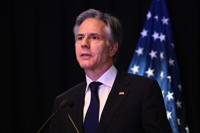 (LEAD) Blinken calls on China to press N. Korea to end its 'dangerous' behavior
(LEAD) Blinken calls on China to press N. Korea to end its 'dangerous' behavior -
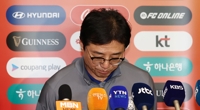 Coach apologizes for missing out on Olympic football qualification, calls for system overhaul
Coach apologizes for missing out on Olympic football qualification, calls for system overhaul -
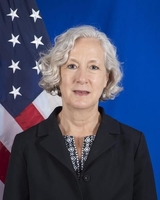 S. Korea, U.S. lay out respective visions for new defense cost-sharing deal: U.S. negotiator
S. Korea, U.S. lay out respective visions for new defense cost-sharing deal: U.S. negotiator -
 BTS' RM to prerelease a track of 2nd solo album
BTS' RM to prerelease a track of 2nd solo album
-
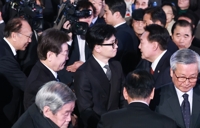 Disagreement over ambassador, presidential aide opens up fresh rift between Yoon, PPP leader
Disagreement over ambassador, presidential aide opens up fresh rift between Yoon, PPP leader -
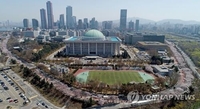 Political parties ramp up campaign efforts amid shifting opinion polls
Political parties ramp up campaign efforts amid shifting opinion polls -
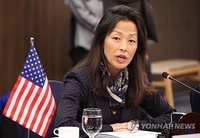 (News Focus) U.S. focus on 'interim' steps with N. Korea raises questions about policy direction
(News Focus) U.S. focus on 'interim' steps with N. Korea raises questions about policy direction -
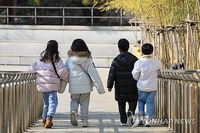 Demographic time bomb in S. Korea over world's lowest birth rate, super aging
Demographic time bomb in S. Korea over world's lowest birth rate, super aging -
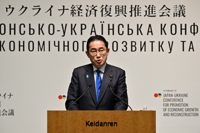 (News Focus) Cautious hopes reemerge for Japan's role over N. Korean nuclear conundrum
(News Focus) Cautious hopes reemerge for Japan's role over N. Korean nuclear conundrum
